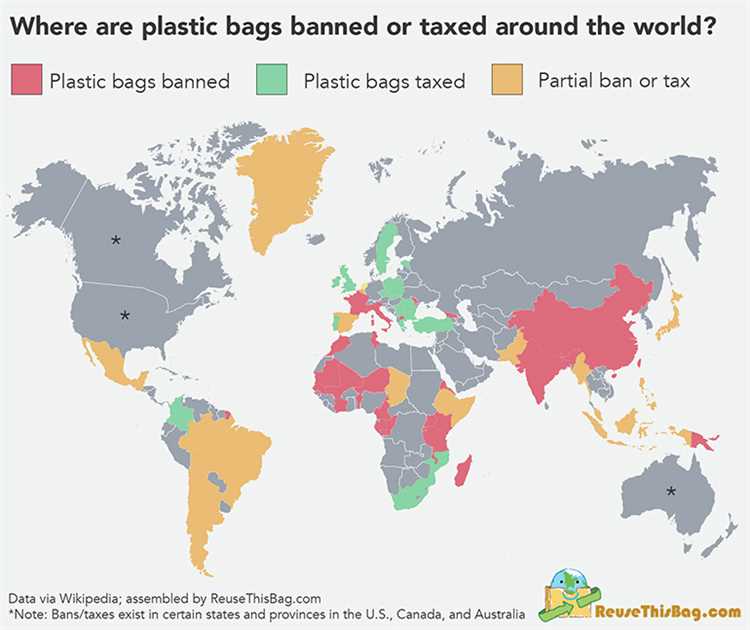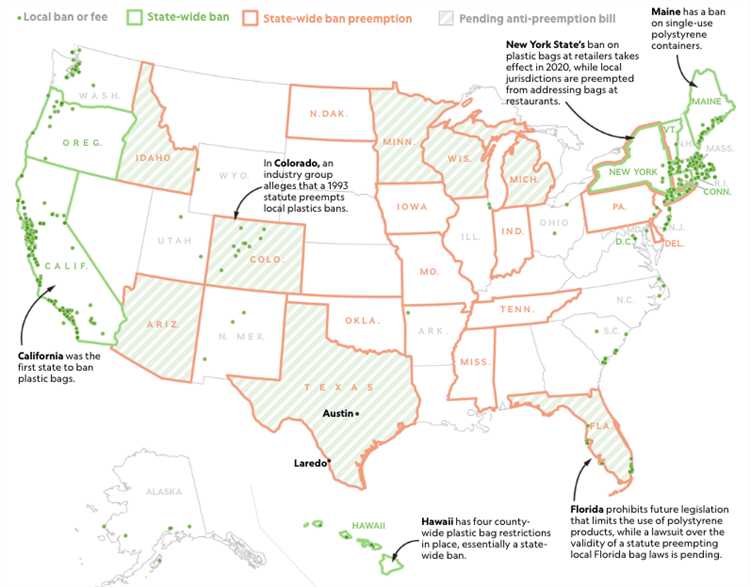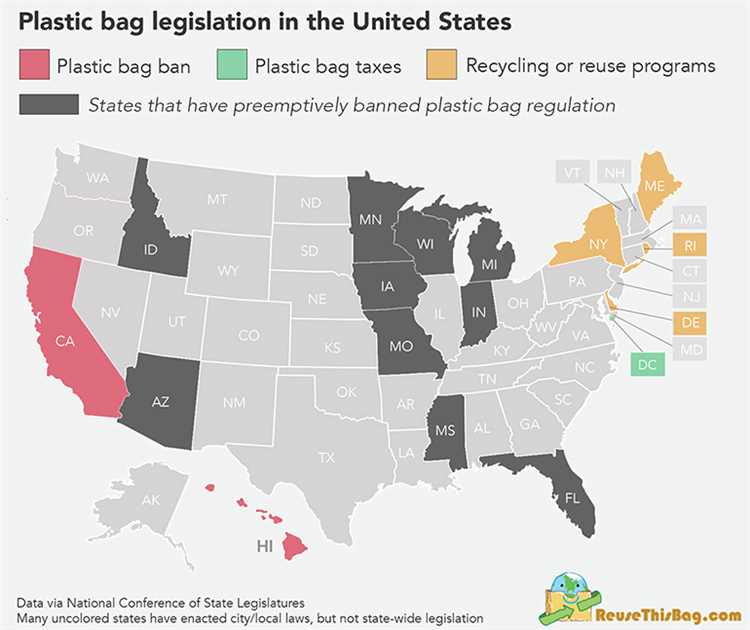
In recent years, the issue of plastic pollution has gained significant attention worldwide. Many countries and regions are taking action to tackle this problem, and one effective way is by implementing plastic bans. Plastic bans aim to reduce the consumption and production of single-use plastic items that contribute to the growing environmental crisis.
Across the United States, several states have taken the initiative to ban certain types of plastic products. These bans vary in scope and can include items such as plastic bags, straws, utensils, and foam containers. The following is a complete list of states in the US that have implemented plastic bans to combat plastic pollution:
California: California is considered a leader in environmental initiatives and was the first state in the US to ban plastic bags in 2014. The ban has since been expanded to include other single-use plastic items.
New York: New York implemented a plastic bag ban in 2020, which prohibits most retailers from distributing single-use plastic bags to customers. This ban aims to encourage the use of reusable bags and reduce plastic waste.
Hawaii: Hawaii has banned plastic bags throughout the state since 2015. The ban aims to protect the unique marine and coastal ecosystems of the islands, which are particularly vulnerable to plastic pollution.
Oregon: Oregon passed a comprehensive ban on single-use plastic bags in 2019. The ban also includes requirements for retailers to charge customers for paper bags, further promoting the use of reusable alternatives.
Connecticut: Connecticut implemented a plastic bag ban in 2021 to reduce plastic waste and encourage environmentally friendly alternatives. The ban applies to both single-use plastic bags and single-use paper bags.
Washington: Washington banned single-use plastic bags in 2021. The ban is part of the state’s efforts to reduce plastic pollution and encourage the use of reusable alternatives.
These states are leading the way in the fight against plastic pollution, and their bans serve as examples for other states and regions to follow. By implementing plastic bans, we can take significant steps towards a cleaner, more sustainable future.
- A List of States
- California
- Oregon
- Washington
- New York
- Hawaii
- Connecticut
- Delaware
- Maine
- Vermont
- Massachusetts
- States That Have Implemented Plastic Bans
- 1. California
- 2. Hawaii
- 3. New York
- 4. Vermont
- 5. Maine
- 6. Oregon
- 7. Connecticut
- 8. Delaware
- States That Are Considering Plastic Bans
- 1. New York
- 2. Massachusetts
- States That Have Partial Bans on Plastic
- States That Have Proposed Plastic Bans
- States That Have Rejected Plastic Bans
- Question-Answer:
- Which states in the United States have banned plastic?
- Why have these states banned plastic?
- How do these states enforce the plastic ban?
- Are there any exceptions to the plastic ban?
- What impact has the plastic ban had on these states?
A List of States
Here is a comprehensive list of states that have banned plastic:
California
California is one of the leading states in the United States that has implemented a statewide ban on single-use plastic bags. The ban went into effect in 2016 and applies to most grocery and retail stores.
Oregon
Oregon also has a statewide ban on single-use plastic bags that went into effect in 2020. It applies to most retail establishments, including grocery stores, convenience stores, and pharmacies.
Washington
Washington state implemented a ban on single-use plastic bags in 2021. It applies to all retail establishments, including grocery stores, pharmacies, and restaurants.
New York
New York state has banned single-use plastic bags since March 2020. The ban applies to most retail establishments and encourages the use of reusable bags.
Hawaii
Hawaii implemented a statewide ban on single-use plastic bags in 2015. The ban applies to all businesses that sell merchandise or food, including grocery stores, restaurants, and convenience stores.
Connecticut
Connecticut passed a ban on single-use plastic bags in 2019, which went into effect in 2021. It applies to all retail establishments and encourages the use of reusable bags.
Delaware
Delaware enacted a ban on single-use plastic bags in 2021. The ban applies to most retail establishments, including grocery stores, pharmacies, and convenience stores.
Maine
Maine implemented a statewide ban on single-use plastic bags in 2020. The ban applies to all retail establishments, including grocery stores, restaurants, and convenience stores.
Vermont
Vermont has banned single-use plastic bags since July 2020. The ban applies to all retail establishments, including grocery stores, pharmacies, and convenience stores.
Massachusetts
Massachusetts banned single-use plastic bags in 2020. The ban applies to all retail establishments and encourages the use of reusable bags.
These are just a few examples of states that have taken action to ban plastic bags. Many other states have also implemented their own regulations to reduce plastic waste and promote sustainable alternatives.
States That Have Implemented Plastic Bans
Over the past few years, many states in the United States have taken significant steps to reduce plastic consumption and pollution by implementing plastic bans. These bans aim to curb the use of single-use plastics and encourage the use of more sustainable alternatives. Here is a list of states that have implemented plastic bans:
1. California
California has been at the forefront of environmental initiatives, including plastic bans. In 2014, California became the first state to ban single-use plastic bags at large retail stores. In 2016, the ban was expanded to include single-use plastic bags at all retail stores, and in 2018, it was further expanded to include restaurants.
2. Hawaii
Hawaii implemented a statewide ban on single-use plastic bags in 2015. The ban prohibits retailers from distributing plastic bags at checkout, encouraging the use of reusable bags instead.
3. New York
New York implemented a ban on single-use plastic bags in 2020. The ban aims to reduce plastic waste and encourage the use of reusable bags. Certain exceptions apply, such as bags used for takeout food and prescription drugs.
4. Vermont
Starting in July 2020, Vermont implemented a ban on single-use plastic bags. The ban applies to retailers and aims to promote the use of reusable bags.
5. Maine
Maine implemented a ban on single-use plastic bags in 2020. The ban applies to large retailers and aims to reduce plastic waste.
6. Oregon

Oregon implemented a ban on single-use plastic bags in 2020. The ban applies to larger grocery stores and aims to encourage the use of reusable bags.
7. Connecticut
Connecticut implemented a ban on single-use plastic bags in 2021. The ban applies to most retailers and aims to reduce plastic waste.
8. Delaware
Delaware implemented a ban on single-use plastic bags and straws in 2021. The ban applies to most retailers and food establishments.
In addition to these states, many others are considering or have already implemented plastic bans to reduce plastic pollution and promote sustainability. These bans are an important step in addressing the plastic waste crisis and protecting our environment for future generations.
States That Are Considering Plastic Bans

While many states have already taken action to ban or limit the use of plastic, there are still several states that are actively considering implementing their own plastic bans. These states recognize the detrimental impact that plastic waste has on the environment and are exploring ways to reduce plastic pollution.
1. New York
New York is currently considering a statewide plastic bag ban. This proposed ban would prohibit retailers from distributing single-use plastic bags and encourage the use of reusable bags. The state aims to reduce waste and promote sustainable alternatives to plastic.
2. Massachusetts
Massachusetts is also exploring the possibility of banning single-use plastic bags. The state has already implemented several city-wide bans, and lawmakers are now considering a statewide ban to further reduce plastic waste. The proposed legislation aims to change consumer behavior and encourage the use of reusable bags.
In addition to these states, numerous other states across the country are discussing the implementation of plastic bans. These states recognize the importance of taking action to address the plastic crisis and are engaging in discussions and debates to determine the best course of action.
As the movement to ban plastic gains momentum, it is likely that more states will join the effort and take steps to reduce plastic pollution. By implementing these bans, states can contribute to a healthier environment and encourage sustainable practices.
It is important for citizens to stay informed and engaged in these discussions, as they have the power to influence the decisions made by their state governments. Together, we can work towards a future free from plastic pollution and create a more sustainable planet for generations to come.
States That Have Partial Bans on Plastic
Although some states have implemented comprehensive bans on plastic, others have taken a more moderate approach by imposing partial bans on specific types of plastic products. These states recognize the environmental impact of plastic waste and have taken action to reduce its usage in certain areas. Here is a list of states that have adopted partial bans on plastic:
1. California: California has banned the use of single-use plastic bags in grocery stores and other retail establishments.
2. New York: New York has prohibited the use of single-use plastic bags in most retail businesses.
3. Hawaii: Hawaii has implemented a ban on single-use plastic bags in most grocery stores and other retail outlets.
4. Oregon: Oregon has banned the use of single-use plastic bags in certain retail establishments.
5. Vermont: Vermont has restricted the use of single-use plastic bags in certain retail establishments.
6. Connecticut: Connecticut has implemented a ban on single-use plastic bags in most grocery stores and retail establishments.
7. Delaware: Delaware has prohibited the use of single-use plastic bags in large retail stores.
8. Maryland: Maryland has banned the use of single-use plastic bags in certain retail establishments.
9. Rhode Island: Rhode Island has restricted the use of single-use plastic bags in certain retail establishments and grocery stores.
10. Maine: Maine has implemented a ban on single-use plastic bags in most retail establishments.
These states have recognized the need to reduce plastic waste and have taken steps towards achieving that goal by implementing partial bans on specific plastic products. While these measures may not completely eliminate plastic pollution, they are important steps towards a more sustainable future.
States That Have Proposed Plastic Bans
In addition to the states that have officially banned single-use plastic, there are several states that have proposed legislation to ban or restrict the use of plastic. While these proposals have not yet become law, they demonstrate a growing awareness of the environmental issues associated with plastic and a desire to take action.
New York: New York has proposed a ban on single-use plastic bags, which would prohibit most retailers from offering plastic bags to customers.
California: California has proposed a ban on single-use plastic packaging for certain products, such as toiletries and household cleaners. The state is also considering a ban on plastic straws.
Massachusetts: Massachusetts has proposed a comprehensive ban on single-use plastic bags, straws, and polystyrene foam containers.
Washington: Washington has proposed a ban on single-use plastic bags, as well as a fee on paper bags to encourage reusable bag use.
Oregon: Oregon has proposed a ban on single-use plastic bags, with exceptions for certain items such as meat and produce.
Hawaii: Hawaii has proposed a ban on single-use plastics, including plastic bags, straws, and utensils, as well as polystyrene foam containers.
Maine: Maine has proposed a ban on single-use plastic bags, as well as a fee on paper bags to encourage reusable bag use.
Note: These are just a few examples of the states that have proposed plastic bans. There are many other states considering similar legislation.
States That Have Rejected Plastic Bans
1. State A: Despite national and international efforts to reduce plastic waste, State A has rejected the implementation of any plastic bans. This state believes that plastic bans would be too costly for businesses and put an unnecessary burden on consumers.
2. State B: Similarly, State B has also chosen not to ban plastic. The state argues that it is more effective to focus on improving recycling infrastructure and educating the public about proper plastic disposal.
3. State C: State C, known for its robust industrial sector, has rejected plastic bans due to concerns about job losses and negative impacts on the economy. Instead, the state has implemented voluntary initiatives to encourage plastic waste reduction.
4. State D: State D has rejected plastic bans, citing the importance of personal choice and freedom. They believe that individuals should have the right to decide whether or not to use plastic products.
5. State E: Despite growing public awareness about the environmental impact of single-use plastics, State E has chosen not to ban plastic. The state argues that alternative solutions, such as biodegradable plastics, should be explored instead.
6. State F: State F has rejected plastic bans due to concerns about the impact on small businesses. The state government believes that implementing a plastic ban would disproportionately affect small retailers and restaurants.
7. State G: State G has decided against plastic bans, stating that the focus should be on developing innovative solutions to plastic waste rather than simply banning the material.
8. State H: State H, home to a significant petrochemical industry, has rejected plastic bans. The state argues that plastic products have numerous essential uses and banning them would have a negative impact on various sectors.
9. State I: Despite neighboring states implementing plastic bans, State I has chosen not to follow suit. The state government believes that alternative measures, such as recycling incentives and awareness campaigns, are more effective in reducing plastic waste.
10. State J: State J has rejected plastic bans, emphasizing the importance of individual and corporate responsibility. They encourage businesses and consumers to voluntarily reduce their plastic usage rather than relying on government-imposed bans.
Question-Answer:
Which states in the United States have banned plastic?
As of now, there are several states in the United States that have banned plastic. Some of them include California, New York, Hawaii, Maine, Vermont, and Oregon.
Why have these states banned plastic?
These states have banned plastic in order to reduce pollution, protect wildlife, and promote sustainable practices. Plastic is known to have a detrimental impact on the environment, and by implementing a ban, these states aim to mitigate this issue.
How do these states enforce the plastic ban?
Enforcement methods vary by state, but generally involve fines or penalties for violations. Some states have implemented strict regulations on businesses and individuals, prohibiting the use of certain types of single-use plastics. Others have set limitations on the sale and distribution of plastic bags or containers.
Are there any exceptions to the plastic ban?
Yes, there are typically exceptions to plastic bans. These exceptions may include medical or safety-related items, like gloves, masks, or certain types of packaging. Additionally, some states allow for certain types of compostable or biodegradable plastics to be used.
What impact has the plastic ban had on these states?
The plastic ban has had a positive impact on these states by reducing plastic waste, promoting sustainable alternatives, and protecting the environment. It has also encouraged businesses and individuals to find alternative solutions, such as reusable bags or containers, which has contributed to a shift towards more eco-friendly practices.